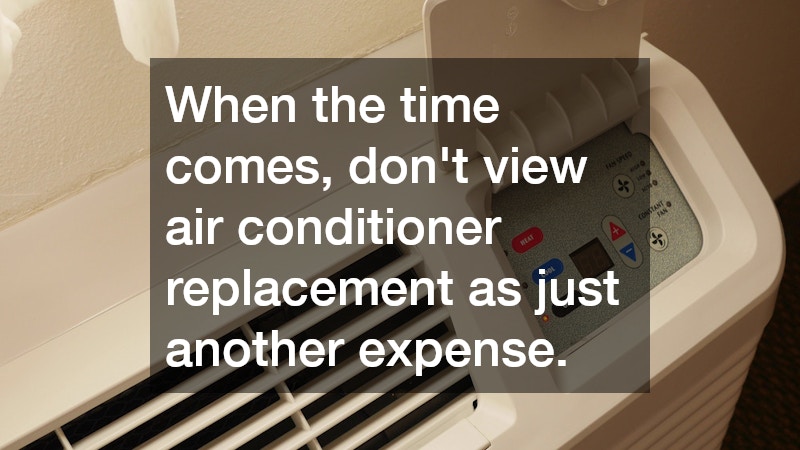
When Do You Need Air Conditioner Replacement? Warning Signs to Look Out For
An air conditioner is one of the most important systems in your home, keeping you cool and comfortable during the hottest months of the year. However, like any appliance, it won’t last forever. Even the most well-maintained unit will eventually reach the end of its lifespan. The challenge many homeowners face is knowing when it’s time for air conditioner replacement versus when a simple repair will suffice. Replacing your unit at the right time not only saves money but also ensures efficiency, comfort, and peace of mind.
Below are the key warning signs that signal it may be time to consider upgrading your system.
Rising Energy Bills
One of the first signs that your air conditioner may be struggling is a steady increase in energy bills. While minor fluctuations are normal, a consistent rise in costs—especially during peak cooling seasons—may indicate that your system is losing efficiency. As air conditioners age, their components wear down, forcing them to work harder to achieve the same cooling output. If you find yourself paying significantly more each summer without a corresponding increase in usage, it may be more cost-effective to invest in a new system rather than continuing to cover high utility bills.
Uneven Cooling
Are some rooms in your house noticeably warmer than others, even when the air conditioner is running? Uneven cooling is a common symptom of an aging or failing unit. This could be caused by worn-out components, leaky ducts, or declining efficiency. While sometimes ductwork adjustments or minor repairs can fix the issue, older systems often struggle to maintain consistent temperatures throughout the home. If you’re battling hot spots despite regular maintenance, it may be time to look into air conditioner replacement to restore comfort evenly across all rooms.
Unusual Noises or Odors
Air conditioners are designed to run relatively quietly. If you start hearing grinding, squealing, or rattling noises, it could point to serious mechanical problems. Similarly, foul odors—such as a musty smell indicating mold growth or a burning smell signaling electrical issues—shouldn’t be ignored. While some of these problems can be repaired, recurring issues often indicate that the system is wearing out. Investing in a new air conditioner ensures safe, quiet, and odor-free operation.
Excessive Humidity Indoors
Air conditioners do more than just cool the air; they also help control indoor humidity. If your home feels sticky or damp even when the system is running, your unit may no longer be able to manage humidity effectively. Excess moisture can encourage mold growth, damage wood furniture, and reduce indoor comfort. In many cases, a new air conditioner with modern humidity control features can solve this problem and create a healthier indoor environment.
Age of the System
The average air conditioner lasts between 10 and 15 years, depending on usage, maintenance, and brand. If your system is approaching or exceeding this age range, it’s worth considering replacement—even if it’s still running. Older units are less efficient, more prone to breakdowns, and often rely on outdated refrigerants that are expensive or no longer environmentally acceptable. By replacing an aging system proactively, you can avoid the stress of sudden failures during the hottest days of the year.
Poor Airflow
Weak airflow is another warning sign that your air conditioner is not performing as it should. If you notice that cool air is barely coming out of the vents, there could be an issue with the compressor or ductwork. While repairs might temporarily restore airflow, recurring issues typically indicate a system on its last legs. Poor airflow not only makes your home uncomfortable but also places unnecessary strain on the system, further shortening its lifespan.
Benefits of Timely Replacement
While no homeowner looks forward to the cost of a new air conditioner, the benefits of timely replacement are significant. Modern systems are far more energy-efficient than older units, which means lower monthly bills and reduced environmental impact. They also come with advanced features such as smart thermostats, variable-speed motors, and better humidity control. In addition, a new unit provides peace of mind by reducing the risk of breakdowns during extreme heat, ensuring your home remains consistently cool.
Recognizing the warning signs of a failing air conditioner is essential to maintaining comfort, safety, and efficiency in your home. From rising energy bills and frequent repairs to uneven cooling and excessive humidity, these red flags often point to the need for a new system. By planning ahead, you can avoid costly emergency replacements and ensure a smoother transition to a modern, efficient unit.
When the time comes, don’t view air conditioner replacement as just another expense. Instead, see it as a long-term investment in your home’s comfort, value, and energy savings. Acting at the right time ensures you and your family stay cool without the worry of unexpected breakdowns or skyrocketing utility bills. With a new system in place, you’ll enjoy reliable performance, improved efficiency, and peace of mind for years to come.
